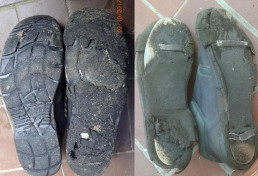“What is the service life of safety shoes? And why does the sole disintegrate after a certain period of time?”
Many users ask these questions. This issue also plays an important role in the new versions of our instruction leaflets. We explain why shoes disintegrate and when you should buy new safety shoes.
Different materials in the show have different service lives
A shoe consists of various components, some of them being subject to natural decay at some point. This is often dependent on the chemical composition of a material. This composition can produce certain properties, but it can also be the reason why the material has a certain useful life.
The material that is responsible for the service life of the majority of our shoes is the polyurethane in the midsole and outsole.
Complaints and, in some cases, alleged quality defects generally reach us via our Quality department. Where these concern specific issues, our experts perform a more detailed analysis in order to identify the cause of the problem. They produce a detailed response based on their findings.
„My sole is falling apart!“
We have even received complaints before where shoe soles have fallen apart immediately, despite infrequent use.
The statements made by the wearers of these shoes were often fairly similar: the shoes were worn extremely rarely and were in fact only stored in the cardboard box for a long period of time.
The wearers had either taken the shoes shown in the photos out of the box in this state, or they had fallen apart straightaway while wearing them.

You should also know that the shoes shown are no longer the latest models. The age of the shoes from their date of manufacture ranges between at least seven years and a maximum of 14 years.
A precise date of manufacture could often not be seen on the tongue labels, and so we had to base this on the last date of production of the model. However, the fact is that all of these shoes had already reached a considerable age and so they appeared to fall apart even though they were only worn very little.
Why do shoe soles disintegrate?
Some of you have no doubt got shoes in your wardrobe of a similar age which are still good to wear. The reason for this is the aforementioned polyurethane (PU) sole material.
Polyurethane (PU) is frequently used in safety shoes as it offers several positive properties.
- Very light
- Very flexible
- Very good shock-absorbing properties
- Highly abrasion-resistant
- Good anti-slip properties
All of this has a very beneficial effect on the wearer’s natural movement patterns and when it comes to the product life of the sole as regards mechanical influences.
The specific composition of PU produces these material qualities, but it also affects the service life of the material.
Above all, the PU sole material is subject to a natural ageing process – hydrolysis.
What happens when soles age?
PU consists of long polymer chains that are gradually split apart due to the effect of moisture. As a consequence, PU loses flexibility over time and gradually becomes brittle.
As the shoes reach an advanced age, this can lead to signs of disintegration in the soles.
But why can storing shoes often be more detrimental to their useful life than if they are worn?
Work shoes are often stored in the basement, shed or garage – places where higher levels of moisture are normally present. And it is precisely this moisture that amplifies the hydrolysis process and causes the shoes to age even more quickly, even though they are not actually being worn.
Other sole materials are also subject to ageing processes. For example, the plasticisers contained in the rubber gradually diffuse out of the material. This also causes the soles to lose elasticity and become hard and brittle.
Ethylene vinyl acetate (EVA), which is well-known from the sports shoe industry, is not subject to hydrolysis, but it does present one disadvantage: it shrinks more quickly when exposed to constant loads like walking and running, and so it no longer returns to its original shape.
This is easily identifiable from the small “wrinkles” that the material obtains.
Our recommendation for you and your safety shoes
Ageing of safety shoes is an entirely normal process that all shoes go through. If we want to benefit from all the positive properties of a safety shoe, we need to be aware of the limited product life of shoes.
We recommend replacing safety shoes regularly. Due to the use and other influences that also have an effect during storage, the shoes do not last indefinitely. Further information can be found in the instruction leaflet that comes with every shoe.
uvex safety footwear
uvex safety footwear with protection class S1, S1 P, S2, S3 and S5 (EN ISO 20345) provides perfect protection in industry sectors such as automotive and machine construction, in the chemical industry, on construction sites, in service and logistics – but also in outdoor workspaces such as horticulture, agriculture and forestry. Our range also includes occupational footwear (protection class O1, EN ISO 20345) and tailor-made orthopaedic safety footwear.
I really like your Article. Thanks for sharing
I’m ofter worry about the soles of my shoes. I didn’t know they use Polyurethanein in those. Well researched article. Will share this with shoe enthusiasts.
I could not resist commenting. Perfectly written!
Loved the article thanks.
Has a method / process/ additive been found to stop this from happening, or is there another material with similar properties that could be used?
Hi Tim, for outsoles of safety shoes there are currently no such possibilities, because each additive deteriorates other properties and influences the achievement of the standard requirements. Best regards, uvex safety